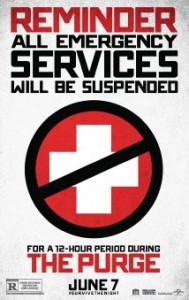Who is my enemy? Who is my neighbor?
Imagine a new America, governed by new laws.
https://www.imdb.com/title/tt2184339/?ref_=ttfc_fc_tt
James DeMonaco presents a new America, governed by new laws, most notably the creation of a holiday called “The Purge”. During “The Purge” all criminal activity including murder is permissible for a twelve hour time frame once each year. Through the Sandin family many striking themes are presented which speaks to the morality of humanity. Apathy, insensitivity, and individualism are challenged through consequential experiences. Director James DeMonaco assumes a certain immorality possessed by humanity. The Purge suggests that a release of hatred and aggression, via criminal activity, during a yearly holiday would provide less overall criminal activity and free humanity from immorality at the cost of sacrificing the lives or property of others. This immorality is problematic as revealed via the lives of the focus characters, the Sandin family.
The husband and father, James Sandin (Ethan Hawke), is a person who profits tremendously from the national holiday. He manufactures and sells security systems specifically designed to secure homes during “The Purge”. These systems are affordable only for the wealthy. Life in a gated neighborhood and protection afforded by elaborate security, garners a sense of disinterest in the plight of those who are less fortunate and disenfranchised. Although James does not specifically participate in the murder and destruction of the weak, poor, and infirmed he exhibits an apathetic attitude toward them.
The wife and mother, Mary Sandin (Lena Headey), is a person who exhibits a sense of insensitivity or unawareness of her surroundings. She is complicit in the behavior of her husband and pretends to be unaware of the problematic nature of the capitalistic motives of her husband. Mary enjoys the perks and benefits of the wealth that has been generated from her husband’s efforts, thus becoming deadened to the sting of the predicament of those who are sacrificed during the yearly “purge.”
The daughter, Zoey (Adelaide Kane), is a person who is primarily concerned and consumed with self. As a teenager she has disconnected from the world and lives life in an all-consuming individualistic fashion. The son, Charlie (Max Burkholder), provides a moral voice to the family. He questions the “purge” and displays a genuine discomfort with the chaos, violence, and apathy associated therewith.
DeMonaco illustrates that apathy must eventually give way to participation. The boyfriend of his daughter, in the spirit of the holiday, attempts to take out his resentment toward the father by shooting him. James kills the boyfriend in self-defense.
Apathetic compliance to immorality has now affected his home, as the immorality of “the purge” is morphed into active participation. The deadened sensitivity of Mary is awakened as she is forced to deal with the realities of murder and a grieving daughter. This incident annihilates the individualistic assumptions of Zoey, as she is arrested forcibly by the interdependent nature of family and humanity at-large. The questions of immorality posed by Max are ushered to the forefront.
Max makes a questionable decision on the night of “the purge” to provide shelter for a representative of the disenfranchised. DeMonaco decides upon a young black male as the ideal American representative of those who are the poor, weak, and infirm. A group of elitists wish to sacrifice him for “the purge.” The pure intention of the holiday is to destroy those who are considered insignificant or void of value. The group of elitists as well as Sandin’s neighbors become hostile towards the Sandin family, first for harboring a “fugitive” and secondly for deep-seated resentment directed toward the husband for making merchandise of them.
Who is my neighbor? The disenfranchised black male proves to exemplify the attributes of a neighbor as he fights for the safety and security of the Sandin family. James is forced to deal with the paradoxical nature of this revelation as his life is stripped from him. The wages of sin is proven to be death. The Samaritan-like behavior of the disenfranchised becomes a model for the Sandin family. The matriarch of the family decides to reject vengeance for those who intended to do her family harm. Instead, she now accepts justice.
Solomon was right: righteousness exalts a nation: but sin is a reproach to any people (Proverbs 14:34).
Joshua Bullock, Youth President of the Greater Refuge Temple in Washington, D.C., one of my current students, wrote this fantastic movie review for an assignment this week. Joshua can be contacted at joshua.bullock80@gmail.com


Sounds like a solid review. I haven’t seen the movie myself. I hadn’t cared to. I figured it was more of America’s decadent Hollywood violence.
But this review puts it in a distinct light for me, arousing my interest in the movie. That there are deeper themes and messages in the movie and that it is not just about violence and slaughter (I’ve seen a great deal of movies that are), greatly intrigues me. They should pay him, as they may have made a sale because of this review. 😉
Thanks for sharing this, Dr. Eckel. I assumed something about a movie and was wrong. I have learned a valuable lesson here.